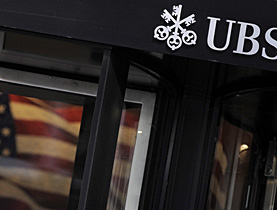UBS accord sends “clear signal” to US taxpayers

A deal by Switzerland and the United States to end a tax dispute between the American authorities and big bank UBS has helped both sides save face, an expert says.
Columbia University law professor John Coffee says this was always the goal of the negotiations between the Swiss and US governments, and that the court case brought against UBS was less about the bank than about sending a signal to taxpayers.
“The Internal Revenue Service was targeting American taxpayers who try to avoid paying tax,” Coffee told swissinfo.ch in New York.
“The US want to scare and intimidate US taxpayers into the voluntary disclosure programme. The US side is interested in the identity of potential tax frauds. It’s all about a law enforcement strategy to intimidate people into voluntary disclosure.”
According to Coffee, the deal has allowed both parties to protect their most critical interests.
“Switzerland needed to defend its sovereignty, respect for its legal system and banking secrecy,” he added.
For the US, he says the goal was access to over 4,000 names of suspected tax frauds, who are believed to have stashed an estimated $15 billion.
“For the IRS, it was always about identifying possible tax cheats,” he pointed out. “Inflicting a large penalty on UBS was never one of the main goals.”
Pressure
So why was UBS threatened with a court case? Coffee says that it was Bradley Birkenfeld, a former employee of the bank’s private banking sector, who put the IRS last year on the trail of a number of people thought to have hidden their money in UBS accounts.
As part of a deal with prosecutors, Birkenfeld explained how money was escaping from the country.
This information was sufficient to launch in February a case against UBS for illegal activities in the US. On top of the court proceedings came a demand for the names of 52,000 of the bank’s clients.
After Switzerland’s financial watchdog intervened, UBS handed over the names of 270 clients suspected of tax fraud. The bank also agreed to pay a $794 million (SFr825 million) fine.
“With the deal, the US tax authorities can keep up their pressure on frauds and even increase it,” said Coffee. Guilty parties have until September 23 to advise the IRS if they want to face smaller penalties.
The IRS is hoping many more tax cheats will step up and confess in the coming weeks, says the law professor – hopefully a total of around 5,000.
This is because they will probably fear being among the 4,450 names the US will have access to under the terms of the accord.
“The prospect of being implicated in criminal proceedings and facing large fines will not appeal to many of UBS’ clients,” Coffee told swissinfo. “No one can feel safe.”
Blueprint for future
The pressure is likely to increase in the coming weeks reckons Coffee. So far four UBS clients have pleaded guilty to tax fraud and another 150 cases are underway.
“I reckon there will a few more high profile cases making headlines before September 23,” he added.
For the US authorities, the strategy is to intimidate tax cheats into turning themselves in, Coffee believes – much more cost effective than dragging people through the court system. The tax section of the US justice department also lacks the personnel to pursue thousands of these cases each year.
For the IRS, the deal has another advantage: it can serve as a template for cases against other banks, in Switzerland or other countries.
“If the tax authorities come across the names of other banks, they will know how to go about getting the names of tax cheats,” he said.
The deal doesn’t just send a strong signal to American taxpayers, but also to banks and other financial institutions.
“Someone who is caught red-handed would be well advised to cut a deal as soon as possible with the US authorities to limit the damage to their company,” reckons Coffee.
He points to what he says is major damage inflicted on UBS’ image because of the ongoing legal battles and the negative media coverage that has ensued. The bank’s wealth management sector in particular has suffered.
“This deal,” he added, “is probably the end of UBS’s role as a vehicle for tax evasion for Americans with mobile assets that they could place abroad.”
Rita Emch in New York, swissinfo.ch (Adapted from German by Scott Capper)
On May 14, 2008, former UBS employee Bradley Birkenfeld and a Liechtenstein businessman were charged by the US authorities with helping an American billionaire avoid paying taxes on $200 million of assets deposited in Swiss and Liechtenstein bank accounts.
Birkenfeld turned whistleblower, giving details of UBS private banking practices to US prosecutors.
In July, a Miami court authorised the Internal Revenue Service to issue a summons on UBS demanding the release of confidential information on clients the agency suspected of tax evasion.
In the same month, UBS told a congressional hearing that it would stop offshore banking activities for US clients.
UBS agreed in February 2009 to pay $780 million and name some United States clients to resolve criminal fraud charges against it. However, this did not affect a separate demand from the IRS for the details of 52,000 UBS clients, in direct contravention of Swiss banking secrecy laws.
In August, Switzerland agreed to process a request by the US for details of 4,450 American accounts of the UBS bank to end a tax dispute between the two countries. Under the accord, which was signed in Washington, UBS does not face a fine or suffer other punitive damages.
The accord is expected to ease tensions in relations between Washington and Switzerland over possible violations of the country’s banking secrecy laws and prevent a clash of Swiss and US jurisdictions.

In compliance with the JTI standards
More: SWI swissinfo.ch certified by the Journalism Trust Initiative










You can find an overview of ongoing debates with our journalists here . Please join us!
If you want to start a conversation about a topic raised in this article or want to report factual errors, email us at english@swissinfo.ch.